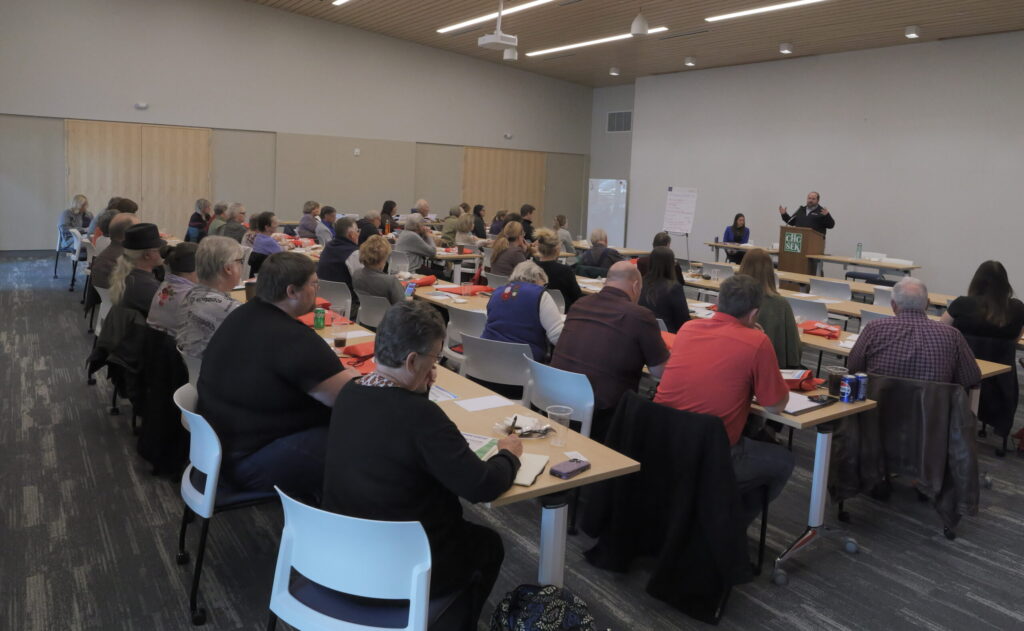
This opinion piece by Health Fund President David Jordan and Thrive Kansas CEO Lisse Regehr originally appeared in the Kansas Reflector on January 23, 2024 and is the first of a two-part series. Part 2, published on March 5, is available here.
Rural Kansas communities are critical to the future of our state.
We know that for our communities to thrive, rural Kansans require core services to raise a family — access to early childhood services, high quality education and health care.
Our two organizations — Thrive Kansas and United Methodist Health Ministry Fund — are based in rural communities and are invested in improving the health and future of all Kansans. We are committed to improving the health of rural communities and support innovative policies that sustain health care and encourage the development of vitally important services.
To better understand rural Kansans’ concerns and ideas, late last year we hosted community conversations on the future of rural health care and Medicaid expansion in Atchison, Dodge City, Colby, Hays and Pittsburg. The events drew community members, local and state leaders, businesses and health care providers. Five key topics — Medicaid expansion, behavioral health, workforce, child care and financial pressure on providers — were raised in each community.
Here are our takeaways.
Medicaid Expansion
The top issue raised was Medicaid expansion. Meeting attendees expressed frustration that many of their working neighbors are uninsured. They recognized that one reason for this is because Kansas has not expanded Medicaid and that by not participating in this program, the state is contributing to higher uninsured rates in Kansas’ rural counties.
The biggest factor driving our high uninsured rates is the strict limits on who can qualify for Medicaid, the state’s health program for low-income families. For example, an uninsured single parent with two children must earn less than $4.75 an hour to qualify for Medicaid. If you don’t have children you cannot qualify at all, no matter how little you make.
Expanding Medicaid would increase eligibility for health care from $9,446 to $34,307 yearly income for a family of three and help provide access to health coverage to an estimated 150,000 residents.
We heard stories about how these strict income limits prevent hardworking rural Kansans from getting care — such as a farmer who could not afford to treat his diabetes and lost his foot. We heard about others who put off care, resulting in missed cancer diagnoses that had devastating impacts.
At each meeting, attendees understood that expanding Medicaid meant their uninsured neighbors, as well as tens of thousands of Kansans, would be able to go to a doctor when they’re sick and pay for prescription drugs. Rural Kansans know that we all benefit when our neighbors can get the care they need.
Financially vulnerable health care providers
Community members, business owners and health care providers who attended these conversations quickly highlighted that the growing uninsured rate in rural Kansas was not just negatively impacting their neighbors’ health but was negatively affecting the bottom lines of health care providers, putting them at financial risk.
Kansans know that more uninsured Kansans means more unpaid bills for providers. When patients can’t pay for care, it is categorized as uncompensated care. When providers have uncompensated care, it challenges their ability to remain financially viable and also means that we all — individuals, families, businesses — end up paying more for health care. In rural Kansas, it also means increased local taxes.
With increasing rates of uninsured residents and high levels of uncompensated care, Kansas has 59 financially vulnerable hospitals, more than any other state.
In Kansas, 44% of the uncompensated care at rural critical access hospitals could be eliminated if we expanded Medicaid.
At each meeting, we heard that reimbursement rates from private insurance have largely been stagnant, not keeping up with inflation, and that the reimbursement rates in Kansas are lower than private insurers’ rates in surrounding states. These low reimbursement rates and payment policies from private insurers create financial challenges for providers.
Also, increased use of Medicare Advantage plans and threats to the 340B drug pricing program are major concerns.
We also heard concerns from providers about private insurers’ approach to telehealth. Providers and patients highlighted their positive experience with telehealth during the pandemic. Rural Kansans expressed a desire for the continued ability to see providers from their homes and on the platform or device of their choosing.
However, private insurers often do not pay the same for an in-person visit as a telehealth visit. In addition, restrictions on where and what devices are being used for visits has reduced the use of telehealth and its financial viability as a long-term approach.
The financial pressures providers face are having an impact on workforce efforts, and in the second part of this series we will highlight lessons learned regarding workforce, behavioral health and childcare from our rural community conversations.
Lisse Regehr is president and CEO of Thrive Kansas. David Jordan is the president of the Hutchinson-based United Methodist Health Ministry Fund. Through its opinion section, the Kansas Reflector works to amplify the voices of people who are affected by public policies or excluded from public debate. Find information, including how to submit your own commentary, here.
Back to All News